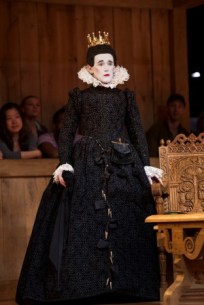Review: Twelfth Night & Richard III

Mark Rylance in Twelfth Night"
(Photo by Joan Marcus)
Unlike ordinary theatergoers, critics don’t have the luxury of picking and choosing their Shakespeare productions, having to sit through every Hamlet and King Lear that comes the pike with depressing regularity. So the prospect of enduring yet another Twelfth Night and Richard III, even if they were being presented by the excellent Shakespeare’s Globe and starring the peerless Mark Rylance, felt like a chore.
So it’s a pleasure, then, to report that these sterling revivals are the finest Shakespeare productions seen on our shores in eons. Performed by an all-male cast and presented with dazzling period authenticity, they bring these oft-performed warhorses to blazing new life.
The productions directed by Tim Carroll are truly immersive, in both the physical and emotional sense. Jenny Tiramani’s unit wooden set recalls the sort of grand indoor halls in which many of the plays were first performed, with boxes on either side accommodating audience members onstage. Large chandeliers contain a multitude of candles, their wax periodically dripping onto the stage. Above the stage is a balcony in which seven musicians play instruments solely from the period, with the program notes proudly informing us that this is the first time Renaissance instruments have been performed live in a Broadway play. Even the costumes are made mainly from materials dating back the late 16th and 17th century. It’s as if one had entered a time machine.
But all that attention to detail would come to naught if the productions themselves weren’t so thrillingly vital. Both the melodramatic, violent Richard III and the deliriously silly Twelfth Night are rendered with a rare immediacy and clarity that, for novices, make the plot synopses provided in the program utterly superfluous.
If I’m partial to the Twelfth Night, it’s because so many productions of Shakespeare’s comedies are filled with broad mugging and frantic silliness. Here, director Carroll and his sterling cast mine all of the play’s rich humor without sacrificing its deep emotions. The actors portraying the female roles, most notably Rylance as Olivia and Samuel Barnett as Viola, never resort to flouncing or affectation. Wearing whiteface, they project femininity without seeming like men in drag. Just the way Rylance practically glides across the stage in his long gowns produces endless laughs.
Add to that Stephen Fry, making his long belated Broadway debut as a Malvolio thankfully devoid of caricature; Angus Wright, hilarious as the buffoonish Sir Andrew Aguecheck; and a priceless Paul Chahidi as Olivia’s loyal lady in waiting, and you have a Twelfth Night that is as riotous as it is sublime.
The Richard III is equally revelatory, thanks to Rylance’s startling interpretation of the title role. He foregoes the traditional menace, portraying the title character with a disarming buffoonery that gives him the air of a stand-up comedian: this must surely be the first time that Richard’s opening “Now is the winter of our discontent” speech has ever induced laughter. But as the play progresses and the body count increases, the character becomes all the more chilling for his disingenuousness. The climactic battle sequence is rendered almost entirely offstage, but its brutality has never been seemed so palpable.
Most Shakespeare productions seen on Broadway these days are designed as star vehicles—think Jude Law’s Hamlet and Denzel Washington’s Julius Caesar—but that’s hardly the case here despite Rylance’s dazzling turns. Rather, they are fully organic and alive, reminding us that the works of the Bard need not be wholly medicinal.
Belasco Theatre, 111 W. 44th St. 212-239-6200. www.Telecharge.com. Through Feb. 2, 2014.
| Print article | This entry was posted by Frank on 11/11/13 at 03:45:32 pm . Follow any responses to this post through RSS 2.0. |